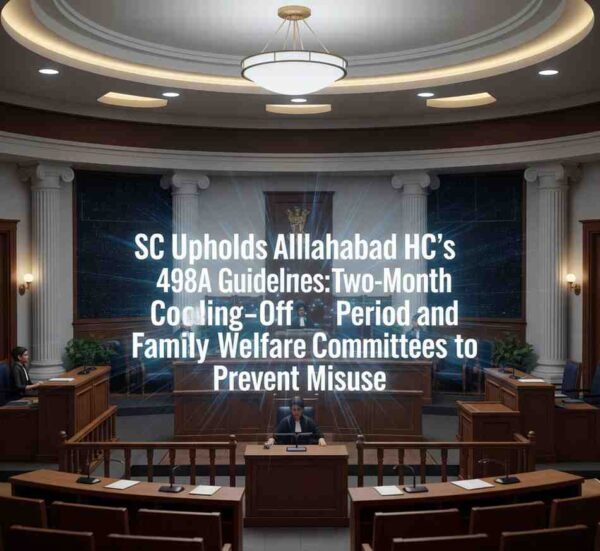SC Upholds Allahabad HC’s 498A Guidelines
In a landmark judgment aimed at striking a balance between justice and preventing the misuse of matrimonial cruelty laws, the Supreme Court of India has upheld and expanded the guidelines previously issued by the Allahabad High Court regarding Section 498A of the Indian Penal Code (IPC). This decision, delivered by a bench led by Chief Justice of India BR Gavai and Justice AG Masih, mandates that the directives introduced by the High Court be uniformly implemented across districts in India.
Background of the Case
The ruling came in the context of the case Shivangi Bansal vs Sahib Bansal, wherein the wife had filed six different criminal complaints under various sections, including 498A, against her husband and his family members. This led to their prolonged imprisonment, raising significant concerns over the misuse of legal provisions designed to protect women from domestic violence.
The Supreme Court took serious note of the unwarranted harassment caused to the husband’s family, concluding that “what they have suffered cannot be resituated or compensated in any manner.” It further invoked its special powers under Article 142 of the Constitution to quash the criminal proceedings and dissolve the marriage, underscoring the exceptional circumstances of the case. In an unprecedented move, the Court also directed the wife and her parents to issue a public apology, acknowledging their moral responsibility for filing false complaints.
Key Highlights of the Guidelines
The Allahabad High Court first laid down these directives in Criminal Revision No. 1126 of 2022, taking inspiration from the Supreme Court’s 2018 ruling in Social Action Forum for Manav Adhikar v. Union of India. That landmark judgment addressed the growing issue of Section 498A of the IPC being misused. The High Court’s guidelines are designed to shield innocent individuals from the distress caused by false allegations, while still ensuring that real victims of domestic cruelty receive proper justice.
Here are the major takeaways from the guidelines:
Two-Month Cooling-Off Period
Once an FIR is lodged under Section 498A IPC, no immediate arrest shall be made. Instead, a two-month mandatory “cooling-off” period will be observed, during which no coercive action is permitted. This time is allotted to facilitate mediation and reconciliation through proper channels.
Referral to Family Welfare Committee (FWC)
All such complaints will be referred to a specially constituted Family Welfare Committee. This committee will conduct a fair and unbiased mediation process and interact with both parties involved in the dispute.
Scope of Application
These guidelines apply strictly to cases under Section 498A IPC. If the complaint also includes serious or non-bailable charges such as Section 307 IPC (attempt to murder), the matter will not be referred to the FWC.
Composition of FWC
The FWC must comprise at least three members, including a mix of social workers, retired judicial officers, young mediators, or even the spouses of senior officers, provided they have a strong educational background. These members will be carefully selected and trained to handle sensitive matrimonial disputes.
Neutrality of FWC Members
Committee members will not act as witnesses in any judicial proceedings to maintain neutrality and avoid any potential bias. Their role is strictly limited to mediation and recommendation.
Mandatory Participation
Both spouses are required to attend FWC meetings, along with up to four elderly members from both families. This aims to promote constructive dialogue and resolution in a familial context.
FWC Report Submission
After the two months, the committee must submit a comprehensive report to the magistrate or police, detailing their findings, interactions, and any resolution or lack thereof. This report will inform the next steps in the legal process.
Restricted Police Intervention
During the cooling-off period, police officials are limited to peripheral investigations. No arrests or harassment of the accused can occur during this time.
Training and Monitoring
The Legal Services Authority will oversee the training of FWC members and police officers, ensuring they are equipped to handle such cases with sensitivity and expertise.
Voluntary and Minimal Remuneration
FWC members will serve voluntarily or for a nominal honorarium, emphasizing their role as impartial mediators rather than enforcers.
Settlement and Case Disposal
If a settlement is reached during this process, the District Judges are empowered to dispose of the case accordingly, providing a swift resolution without the need for prolonged litigation.
Impact of the Judgment
This judgment represents a significant shift in how matrimonial disputes under Section 498A IPC are handled. While the law remains a vital tool for protecting women from cruelty and dowry harassment, the Supreme Court has acknowledged the growing concern around its misuse. False cases not only drain judicial resources but also inflict irreparable damage on the accused and their families.
By institutionalizing the role of Family Welfare Committees and introducing a mandatory waiting period, the Court has taken a balanced approach — ensuring that genuine victims receive justice while protecting innocent individuals from being unfairly penalized.
Conclusion
This Supreme Court ruling, reinforcing the Allahabad High Court’s directives, marks a defining moment in the modernization of matrimonial laws in the country. These reforms, if implemented effectively, can restore faith in the justice system by filtering out frivolous complaints and encouraging amicable solutions. The Shivangi Bansal vs Sahib Bansal case serves as a cautionary tale and a catalyst for systemic change, ensuring that justice is neither delayed nor misused.

























